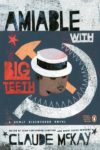Lost and Found
 A novel by the influential Harlem Renaissance author Claude McKay, Amiable with Big Teeth (PRH/Penguin; Blackstone Audio; OverDrive Sample) was all but lost in the Columbia University archives. It remained unpublished for 70 years until it was discovered by a doctoral student while doing research, causing a flurry of news reports.
A novel by the influential Harlem Renaissance author Claude McKay, Amiable with Big Teeth (PRH/Penguin; Blackstone Audio; OverDrive Sample) was all but lost in the Columbia University archives. It remained unpublished for 70 years until it was discovered by a doctoral student while doing research, causing a flurry of news reports.
Published last month, it now sports an eye-catching cover and has received a series of pre-pub reviews that drove libraries to buy copies.
Consumer coverage is now catching up.
Time says the novel “lives up to McKay’s reputation. The book satirizes life in Harlem during the 1935 Italian invasion of Ethiopia … Socialites, intellectuals and hucksters debate the conflict abroad from the parlors and churches of Harlem … McKay mocks both sides, but he knows the stakes: ‘If a native state can maintain its existence in Africa and hold its head up among the white nations,’ one character says, ‘it adds to the self-respect of the colored Americans.'”
Paste reports on the find and the authentication process. The Atlantic provides an in-depth feature.
Claude McKay was already known to the literary world. His 1922 collection of poetry, Harlem Shadows, was a landmark work “that helped usher in the Harlem Renaissance” writes The Atlantic.
At the time the novel was discovered, the NYT provided a account of McKay’s writing and influence on a “generation of black writers, including Langston Hughes. His work includes the 1919 protest poem If We Must Die, (quoted by Winston Churchill) … He also wrote the 1928 best-selling novel Home to Harlem.”
Henry Louis Gates Jr., the Harvard University scholar and one of experts who examined the novel, told the paper, “This is a major discovery … written in the second half of the Harlem Renaissance, it shows that the renaissance continued to be vibrant and creative and turned its focus to international issues.”
